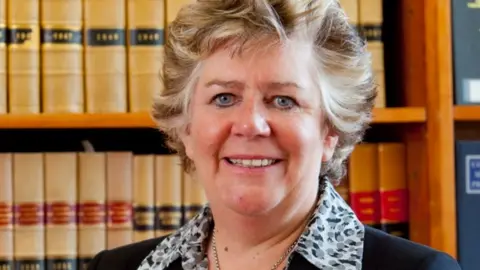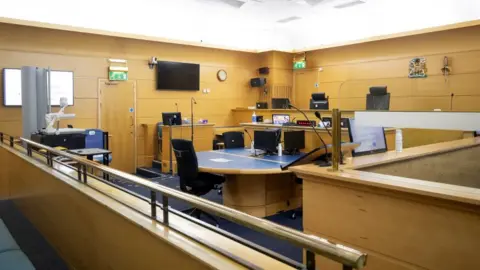New sentencing guidelines for under 25s come into force
 PA Media
PA MediaA new sentencing guideline which make rehabilitation rather than punishment a primary consideration when sentencing young offenders has come into force.
Last year the the Scottish Sentencing Council recommended an "individualistic approach" for under 25s which takes into account their life experiences.
It argued that the proposed changes would help reduce reoffending.
The council said its decision was based on scientific evidence that the brain is not fully developed below that age.
Human rights lawyer John Scott told BBC Radio's Good Morning Scotland that the guideline also recognises that many young offenders have suffered abuse or neglect.
But Scottish Conservative justice spokesman Jamie Greene told the programme lighter sentences would send out the wrong message to victims.
The Sentencing Young People guideline was approved by the High Court and followed a public consultation on the issue in 2020.
 Scottish Courts Service
Scottish Courts ServiceAt the time Lady Dorrian, Lord Justice Clerk and chairwoman of the council, described the sentencing of young people as a "complex and challenging exercise which requires a more individualistic approach".
She added it needed to take into account their unique personal circumstances as well as their intellectual and emotional maturity.
The guideline will apply to the sentencing of all those who are under the age of 25 at the time of their conviction.
The guidance gives more detail on how the assessment of a young person's maturity has a bearing on culpability, and gives more clarity on how the impact on victims is to be taken in account.
It suggests factors common to many young people who commit offences, such as childhood trauma, should be considered.
But it makes it clear that the full range of sentencing options will remain open to courts when sentencing a young person.
John Scott QC said the courts always get details about the harm that a crime has caused.
But, as the guidelines go live, he told Good Morning Scotland: "They don't always get full information about the maturity of the individual, the trauma that they may have suffered and therefore the blame that maybe appropriately attached to them.
"This guideline is about getting more information as well as maximising the opportunities for rehabilitation, which obviously, benefit us all and avoid future victims."
Mr Scott said the sentencing process involves not only assessing the offence but also the person who has offended.
 PA Media
PA MediaHe added: "In some cases, especially for those under 25, they may have been the victims of crime themselves.
"One of the mistakes that is often made is to categorise victims in one place and those who offend somewhere else.
"Actually there is a huge overlap and very many who end up in our criminal justice system have themselves been victims of either neglect or abuse as children."
Mr Scott said those experiences can have a "damaging effect" on the growing brain.
Evidence from across the world was analysed by experts at the University of Edinburgh to identify the cut off age of 25, he said.
The QC added the guideline does not tie the hands of judges but rather will enable them to do their jobs better, for example through handing out Community Payback Orders instead of short custodial sentences.
But Jamie Greene MSP said he has some concern as he believes the justice system is already "weak".
He told Good Morning Scotland: "I think that many victims of crime will be quite worried and concerned about the sort of language that we are using here, especially those who have been the victims of, for example, gender-based violence or sexual crimes, wondering why on earth 24-year-olds will have a shorter sentence than someone who is just a few months older.
"This arbitrary line in the sand that has been drawn will, I think, be contentious."
